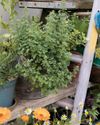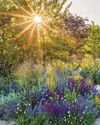
Garden design is a topic much talked about in lofty circles so much so that the very prospect can be intimidating to those who are trying to get to grips with a new garden or an old one that simply wants 'sorting out'.
Let me be clear. I am a gardener who designs a bit - well, probably quite a lot, to be honest - rather than someone who touts themselves about as a 'garden designer'. I was taught the subject by John Brookes at Kew Gardens, and over the years - at home and on television - I have designed hundreds of patches of earth, and yet I'm still reluctant to saddle myself with that title. But I have learned quite a lot on the way - what works, and what usually doesn't.
Over the coming months, I hope I can help you to feel less intimidated by the design process, and to master a few basic dos and don'ts. I'm wary of calling them rules, since 'taste' comes into it, and taste is a personal thing. The most important 'do' is to create a garden that you love being in, regardless of what others might say. You need to create a garden that will inspire you.
Making a start
Perhaps your garden lacks features that you have always wanted. Or maybe they are present but just don't 'work'. Most folk like to grow a few things they can eat, are keen to encourage wildlife and would dearly love somewhere to sit and entertain.
The start of the year is a great time to sort things out - little will grow between now and the end of March, so you have a chance to get work underway, provided the ground is not muddy or frozen solid. There are usually enough gaps in the weather to let you crack on.
Cast a critical eye over your plot and bear in mind the following:
This story is from the January 2023 edition of Gardeners World.
Start your 7-day Magzter GOLD free trial to access thousands of curated premium stories, and 9,000+ magazines and newspapers.
Already a subscriber ? Sign In
This story is from the January 2023 edition of Gardeners World.
Start your 7-day Magzter GOLD free trial to access thousands of curated premium stories, and 9,000+ magazines and newspapers.
Already a subscriber? Sign In

A new plot for tasty crops
Taking on a new allotment needn't be hard work. By simply following a few easy tips you can have bumper crops in no time, just like Alessandro Vitale

We love July
July is an island floating between the joy of June and the slightly fatigued month of August. It's a grown-up month: the year has shrugged off its adolescent exuberances, the weather is (hopefully) warm enough for ice cream to be one of your five a day, the sea should be swimmable without (too much) danger of hypothermia and thoughts will be of holiday shenanigans and family barbecues. School's out this month, the next tranche of glorious summer colour is washing across our borders and it's my birthday. Lots of reasons to give three rousing cheers for July!

YOUR PRUNING MONTH
Now, at the height of summer, Frances Tophill shows how to boost your plants' health and productivity with a timely cut

Hassle-free harvests
Flowers are out in abundance this month and for Jack Wallington, many of these blooms make delicious, low-effort pickings

Bite-sized bounties
Glorious doorstep harvests can easily turn into gluts, so let Rukmini Iyer's recipes help you savour every last bit

Upcycled outdoor living
Create unique and stylish garden features for minimal cost using reclaimed materials and simple DIY skills. Helen Riches shares four step-by-step projects and more inspiring eco tips

Secrets of a COLOURFUL GARDEN
Buildings and landscapes can play a vital role in supercharging your space, as Nick Bailey demonstrates

Greening up a city balcony
Looking for sustainable, small-space gardening ideas? Take inspiration from Oliver Hymans' transformed balcony garden in north-east London - now a lush, green haven for humans and wildlife

The dry and mighty garden
As we adapt our gardens to a more volatile climate, Alan Titchmarsh reveals how to create a drought-tolerant plot and picks his top plant performers

Nature knows best
Carol Klein explains how to choose plants for specific growing conditions, based on what has naturally adapted to thrive there